

God as disruptor
Scripture reminds us that God’s ways and thoughts are not like ours
SEE PAGE 3

Outreach at St. George’s
Community partnerships and strong volunteers key to delivering care and compassion year round
SEE PAGE 4



Scripture reminds us that God’s ways and thoughts are not like ours
SEE PAGE 3

Community partnerships and strong volunteers key to delivering care and compassion year round
SEE PAGE 4
Synod motion to pledge $ for Renovation of guest house
SEE PAGE 7

Dialogue to stop printing in 2025, to join AnglicanNews online
In December of 2011, Bishop Michael Oulton wrote a letter to the congregations of the Diocese of Ontario outlining Synod Council decisions to suspend certain ministries in order to deal with a deficit budget. One of those decisions made was to stop the printing of the Dialogue newspaper. The editor at that time, Francie Healy, said in her note to the diocese in that last January 2012 issue: “It’s a new, if difficult, time for the diocese, and although transition can be painful, it can also mean a bold journey forward into new ventures, perspective and opportunities.”
Just over a year and a half later in May of 2023, I began my career as communications officer for the diocese and along with that, the new editor and designer of a resurrected Dialogue— returning to print as a quarterly newspaper. My first issue was published September 2013.
While the last 11 years as editor and designer of Dialogue has proved rewarding, and the return of Dialogue offered many opportunities for Anglicans to connect with parishes and ministries across our diocese, the
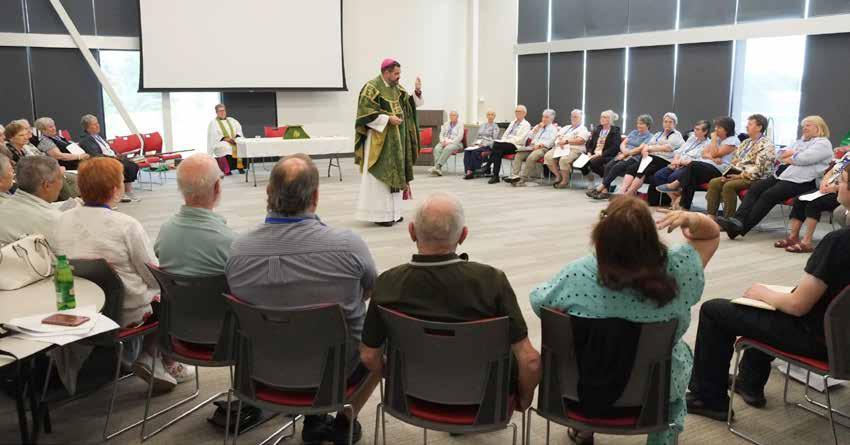
time for transition has again arrived.
With the Diocese of Ontario facing new budgetary financial pressures, and both a declining Dialogue subscriber base and decreasing roster of volunteer contributors, I met with Bishop Cliff and Synod Council in June and proposed that, as of 2025, Dialogue should stop printing—but will continue as an online newspaper to be hosted on the new AnglicanNews. ca website.
Over 10 years on, Francie’s words ring true again: “transition can be painful, it can also mean a bold journey forward into
new ventures…”
This bold journey forward holds true for the Anglican Journal and the rest of the diocesan newspapers as well. Launched in February of 2022, AnglicanNews. ca is a new online partnership between the Anglican Journal and all the diocesan newspapers. This central site allows Anglicans to connect not only with the Anglican Journal but also participating diocesan newspapers—including Dialogue. To quote Tali Folkins, the editor of the Anglican Journal on the new AnglicanNews.ca
website: “This new central site will allow Anglicans
across the country to connect with each other in a way that has never before been possible: with just a few taps or clicks of the mouse, you’ll be able to access an unprecedented amount of local, national and international news about the church, plus spiritual reflection, reviews and more.” Other dioceses in Canada have already discontinued their print publications and are hosting their diocesan newspaper online on AnglicanNews.ca. The benefit to them being eliminating printing and distribution costs for their papers and having an online site already
built and available for them to access. There is no cost for dioceses to host their publications on AnglicanNews.ca. All expenses are borne by the national office.
This is a universal time of transition for most print publications, daily newspapers and periodicals. Shrinking budgets, changing readership demographics and the reality of a society that increasingly consumes its content online has had dramatic impacts on how we read. Whether you are welcome to it or indifferent to it (or against it), change is inevitable. The church certainly knows this.
The final print issue of Dialogue will be the Winter 2024 issue (following this fall issue). Dialogue will launch on AnglicanNews.ca at some point this fall. As the current editor (and maybe not the last), I thank you for your continued readership and support over these last 11 years. May you continue to enjoy our diocesan newspaper via its new online version in the years to come. I am confident it will prove to be a ‘bold journey forward into new ventures.’
Dark clouds loom!
Increasingly devastating news about climate; wildfires, historic heat waves, devastating droughts and floods, climate refugees; all converge with political news to create an “apocalyptic feel”. With each wave of destruction, it seems as if the earth groans; a “birth pang” moving us towards the birth of some kind of world we haven’t known before; as St. Paul wrote: “For we know that the whole creation has been groaning together in the pains of childbirth until now.” (Romans 8:22) It’s obvious that the entire created order is being subjected to the decay caused by human greed: sin, as Paul says in that chapter. And the remedy was already muted in verse 19: “For the creation waits in eager expectation for the children of God to be revealed.”(NIV) If “nature”, or “the Creation” as the Bible calls it, is nothing but dead matter and non-intelligent energy, then why would it “wait with eager longing” for anything at all? It wouldn’t.
Paul describes a more helpful response than is common in today’s world. It is neither bravado, nor cowering in fear. Hope is trust that God will make sense out of our actions,
even if the results of this action are not seen quickly (see verse 24). Earlier in Romans, Paul wrote: “endurance produces character, and character produces hope” (Romans 5:4). Thus, all our responses are fitting for bearers of the gospel; “good news”, not a counsel of despair, or anger, or hatred. The source and model of hope is Jesus himself. The good news is that Jesus has come and has fulfilled all the hopes written in the Law and the Prophets. Jesus said: “Do not think that I have come to abolish the Law or the Prophets; I have not come to abolish them but to fulfill them.” (Matthew 5:17.) He does not cancel them, but fulfills them, he “fills them up” – that is, he fills up the original intention of what the Law and the Prophets were truly getting at.
Since we believe that the Old Testament spelled out clearly our mandate to “till and guard” the garden, the understanding of the continuation of that mandate is suggested strongly by St. Paul’s message that “the creation waits with eager longing for the revealing of the sons of God.” That is: those who show themselves by their conduct to be true offspring of the Holy God. From them we shouldn’t expect to find any greed or selfishness in the way they do their work. Paul isn’t talking about multiple Messiahs here. His




epistles spell out clearly that all who follow Jesus are “sons” (or daughters) of God; but there is only one Messiah.
Jesus trusted that the church would be the epicentre of God’s kingdom. Yet He did not at all limit the Holy Spirit to the confines of a church or Temple. The Acts of the Apostles disrupts any neat patterns for the order of events for belief, water baptism, and baptism in the Holy Spirit. The Bible gives us reasons to expect that signs of hope will crop up in places where the church does not expect to find them.
Today there is an increasing sense of hopelessness. An increasing number say: ‘everything we do to make the environment better only ends up making things worse.’
Many among them are ‘Generation Z’ in their 20s. Despair is in the ‘zeitgeist’, the spirit of the age. The counsel of despair is the natural human tendency when sources of hope decline. Also, there is in-
creasing backlash against all experts, and with every wave of bad news there is an equal and opposite backlash against bad news bearers, as if they were the cause of bad news. People will generate reasons for “shooting the messenger” in such a time. St. Paul wrote in his first letter to the church in Corinth: “What do I gain if, humanly speaking, I fought with beasts at Ephesus? If the dead are not raised, ‘Let us eat and drink, for tomorrow we die.’” (1 Cor. 15:32)
He recognized that despair doesn’t lead people to more or better action, but rather to inaction and self-destructive behaviours. The resurrection of Jesus gives all a hope for new life to come. In the verses following he compares the resurrection body to a plant growing out from a seed.
I see several reasons for the sort of hope that can and should guide our own individual choices, and way of life.
The ground of hope









is God, not technology. Any technological change that merely tinkers with the 20th century’s ways of doing things will not move the needle enough to make the kind of difference we need to see. If all we do is exchange one technology for another, without challenging any fundamental ideas about how we choose to live our lives, then even a massive technological transformation is unlikely to help, ultimately. However, this is not a reason for despair, as some would make it out to be. Instead, we should see it as a challenge to our current assumptions and values. If we are ready to change those basic assumptions and values (and this is what New Testament Greek calls metanoia, ‘to change your mind’, usually translated: ‘to repent’) then we may stand a chance. There is good reason to hope that ‘Gen Z’ finds better ways to live in cities, and makes that the ‘new normal’. In the next article I will go into more specific detail, with examples that give us added hope. Biblical hope is better than simple optimism, and it is better than ‘making lemonade’ out of life’s ‘lemons’ there is a God-given creativity that inspires some to do that, and do better!
Next issue: Part 2 specific reasons for hope.

Editor: Mark Hauser
Publisher: The Right Reverend William Grant Cliff Bishop of Ontario Office of the Incorporated Synod of the Diocese of Ontario 165 Ontario Street Kingston, ON, K7L 2Y6 Ph: (613) 544-4774 www.ontario.anglican.ca
Editorial and Advertising Office Mark Hauser, Editor 165 Ontario Street Kingston, ON, K7L 2Y6 Ph: (613) 777-0534 mhauser@ontario.anglican.ca
Dialogue is published quarterly in September, December, March & June Individual suggested donation: $15.00 per year in Canada $23.00 in U.S. and overseas. The paper is printed on partially recycled paper using vegetable-based inks.
Submissions for Dialogue and letters to the editor can be made by email to mhauser@ontario.anglican.ca
Fall issue: July 15
Winter issue: October 15.
Spring issue: January 15
Summer issue: April 15.
Submissions:
Articles - 600 words max.
Letters - 300 words max.
Questions or information: mhauser@ontario.anglican.ca
Advertising material should be sent to the editor, call (613) 777-0534 with any inquiries.
Opinions expressed do not necessarily reflect the views of the editor, the Diocese of Ontario or any representative thereof, except where expressly stated. All material subject to editing.
Printed and mailed by Webnews Printing, North York, ON To subscribe, unsubscribe or change an address, please contact circulation at: 416-924-9199 Ext. 259/245 or email: circulation@national. anglican.ca
Bishop William Cliff
Disruption is a word that more often than not can strike fear into the hearts of people who are terrified of inconvenience. The map application which I use in my truck as I make my way around regularly warns me of ‘traffic disruption’ and calculates an alternative route to carry me on to my destination with a minium of delay. Sometimes however, on the larger roads, we simply run into the block of traffic with no way out, and no way off; so we sit, and wait.
Disruptor: (noun) a person or thing that prevents something, especially a system, process, or event,from continuing as usual or as expected ( Cambridge Dictionary).
Disruption is a word that has begun to be used regularly in the business world too. ‘Disruptors’ are companies whose ideas and modes of business take over an industry in such a way that the established businesses don’t see it coming. By the time they cotton on to what is happening, the disruption is well underway and it’s too late to fix it. Think about how big the Kodak film company was before digital photography disrupted everything. Or how many of us have an old Blockbuster Video card in a drawer long after the store itself closed.

“‘Disruptors’ are companies whose ideas and modes of business take over an industry in such a way that the established businesses don’t see it coming. By the time they cotton on to what is happening, the disruption is well underway and it’s too late to fix it” - Bishop Cliff. Graphic-Shutterstock
Netflix and streaming movies were something that disrupted the normal business of movie nights at home. Both Kodak and Blockbuster are examples of titans in the business world that could not see the disruption that was coming to their businesses because they did not have a view to how the world was changing around them.
The same can be said to be true for the church in some ways, although in the vision which the scripture casts for the church, the Holy Spirit is meant to be the disruptor. Whether it is the religious establishment, the kingdoms and empires of the world, our sin
and shame before God, or even our own understanding of how God is going to deal with us, we have plenty of moments in scripture where God acts as the great disruptor. Either personally in convicting someone of their sin (like Paul on the road to Damascus) or corporately where God interrupts what everyone thought was the plan. Consistently, God reminds us that “my ways are not your ways and my thoughts are not your thoughts.” – Isaiah 55. No matter what century, be it synagogue or church, we generally shudder at the prospect of (as the above definition explains) disruption of a
system, process, or event, from continuing as usual or as expected.
As people of faith we acknowledge that there are many systems, processes or events that ought to be disrupted. Think of the cycle of poverty and perpetual debt that some find themselves in. Or perhaps the system of bondage and enslavement that seems nearly invisible to us as human beings are trafficked around the planet in general—and up and down Hwy 401 in particular. These are systems and processes that need to be disrupted.
This is why I have been preaching week by week in the parishes about



the ways in which the Church is being called to be agents of the disruptive Spirit. In places where human dignity is ignored, stand up for those who are unseen. Where people are oppressed and forgotten by poverty, intervene in their lives in ways which can break the bondage of that gnawing sense of want.
If we think of our churches as communities where people can find hope in the midst of whatever distress, loss or trauma that they have suffered, we will become a hopeful place where we might be agents of disruption to all those forces which brutalize or trouble the children of




God. We need not take on the whole structure of injustice or sin around us, but we do have a responsibility to work one life at a time at disrupting the effects of that brokenness. We also have to remember that all our work is “one life at a time”. If we are conscientious about it, our little communities can grow and do to the systems and merchants of misery what the business disruptors did to Blockbuster and Kodak. At the very least, why don’t we equip ourselves to serve and limit the market share of death and misery in our modern day world?

AsSavoula Stylianou street van outside the doors of OSGK wherein clients can receive basic, free and necessary medical care that they might not otherwise have easy access to.
Kingston’s oldest food-providing agency, Outreach St. George’s Kingston (OSGK) has been successfully helping the under-served populations of Kingston and the surrounding areas for the past 40 years.
As an organization, it is our mission to provide much-needed support to our clients in whichever way they need it. We are guided by our vision to improve the lives of our clients, whether that be through a warm meal, necessary articles of clothing, or providing space for hospitality and companionship. With our most popular program, Lunch by George, OSGK served over 24,000 meals to our under-served populations in Kingston in 2023 alone.
In times of great difficulty and uncertainty, certainly after the COVID-19 pandemic, our clients’ needs shift constantly and we as an organization are adapting to meet those needs in whichever ways we can. One example of this is the introduction of a nursing
Another example of OSGK’s continued outreach through the community of Kingston and the surrounding areas is with strong partnerships with other food-providing agencies, local restaurants and educational institutions like Queen’s University and St. Lawrence College. We are grateful for our community partners and volunteers alike who assist us in serving our clients over 300 days of the year. Along with our significant partners at the United Way of KFL&A and St. George’s Cathedral, OSGK is able to continue to deliver outstanding care and compassion to everyone who passes through our doors. To learn more about Outreach St. George’s Kingston, please visit our website: https:// lunchbygeorge. ca/ or email us at osgklunchbygeorge@ gmail.com.

Mark Hauser
Irememberthe first time I read the book ‘The Wealthy Barber,’ about personal financial planning. A quote from that book instantly stood out in my mind when I read it: “Most people don’t plan to fail, they fail to plan.” While it continues to be debated who actually first uttered those wise words, the message itself is rock solid. And it applies not just in financial planning but more importantly in personal estate planning as well.
When most people think about estate planning, they think about creating a will. The problem today is that a lot of people don’t think about estate planning. According to a 2023 CIBC survey, 50% of Canadians do not have a will. Respondents said they thought they were too young or did not have enough assets to justify personal estate planning and creating a will.
The truth is if you
own real estate, vehicles or other personal effects then you have an estate. The costs of not planning can be high and you may be creating unnecessary stress for your family and loves ones upon your death. If you don’t decide what should happen when you die, then the government will, and this could lead to your estate paying more money on probate and taxes than you would like. Worse than that, your estate may go to persons you would not have wished to benefit!
The good news for Anglicans is that the Diocese of Ontario will be hosting estate planning workshops this October with local experts Walter Viner and Ian Fraser. Walter (now retired) was the founding and senior partner with the Viner, Kennedy, Frederick, Allan & Tobias law firm and is a Certified Executor Advisor. Ian is a Legacy Advisor and Estate Planner and a long serving resource development officer in Kingston (KGH Vice-


President, Development; Director of Development, Queen’s University).
These workshops will focus on strategies to maximize the value of one’s estate as well as minimize the amount of tax your estate will owe at the time of death. They will address common mistakes and pitfalls people make in estate planning, choosing your executor(s), what happens if you don’t have a will, ensuring a smooth transition for your heirs, powers of attorney and many more important estate planning considerations.
Participants will have the opportunity to ask questions both in writing and verbally with Q&A sessions following each
Ian Fraser (L) and Walter Viner (R) will be guest presenters at the Diocese of Ontario Estate Planning workshops in October.
presentation.
The workshops will be held in three locations across our diocese: Belleville, Kingston and Gananoque (see side panel). All are welcome to attend whether you already have an estate plan in place, or you have yet to even begin the process. Whether you are in your ‘golden years’ or are in your early 20’s or 30’s, it’s never too soon to begin your estate planning journey. Delaying the process can cause unnecessary stress for your family and higher costs for your estate. Don’t be caught failing to plan! If you have agreed to act as an estate trustee (executor) these sessions will also be of great benefit to you.

The Diocese of Ontario is hosting estate planning workshops focusing on maximizing your estate and reducing the amount of tax owing at the time of death. Topics will include:
•How many executors do I need?
•Should my spouse be my executor?
•If I have a will, do I need a Power of Attorney?
•If I do not have a will, what happens?
•How much should I leave my children?
•I might be an executor, what is my job?
•How can I pay less to the Government?
•My will is 20 years old, is it still good?
Oct 8, 2-4 pm: St. Thomas’ Belleville Oct 10, 2-4pm: Christ Church, Gananoque Oct 15, 2-4 pm: St. Mark’s, Barriefield.
The cost for participants will be $25 with all proceeds to benefit Lunch by George.
Sylvia Dopking
“With God nothing is impossible”
quoted Bishop William Cliff at the closing Eucharist of this year’s Summer Fruit for Souls—which this year for the second time was held at St. Lawrence College.
This annual residential and virtual conference for Lay readers and other interested lay people has been presented by the lay readers of the Diocese of Ontario for just over two decades.
With the construction of new buildings on the property of the Sisters of Providence the conference location was moved last year to the college where residential facilities are available. However the collegiality, community, and companionship remained in place.
About thirty participants were at the college and each day seventeen participants joined us online with the help of Dave Bell, our reliable ‘techie’ who kept presenters and participants on the same page. Participants had no trouble agreeing with the bishop about the possibility of all things happening. We were treated to speakers of the highest order. Our keynote speaker was The Reverend Canon Dr. Lizette Larson-Miller whose topic was “Presid-
Challenge to us in our diocese–Autumn
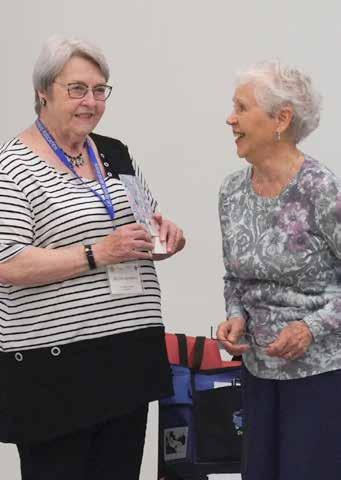
ing with Style, Grace and Understanding: liturgical leadership and lay ecclesial ministry.” Each morning for two hours Dr. Lizette took us through historical aspects and theological reasons for the liturgies we use today in our worship. Each talk left us with a feeling of surprise that ‘we didn’t know that’ and understanding of why we do what we do as Anglicans.
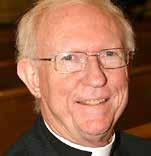
A New Zealand Prayer Book
“God does not want us to do extraordinary things; He wants us to do ordinary things extraordinarily well.”
The Right Reverend Charles Gore, fifirst Bishop of Birmingham, Church of England.
Another helpful quote as we think carefully about our vocation as disciples of Jesus Christ to be faithful and responsible, year-round stewards of our blessings: “Father, enliven the Church for its mission that we may be salt of the earth and light to the world.”
Those who know me well know I love helpful, thought-provoking quotes. I used many from various sources for 21 years as senior national gift-planning officer of the Anglican Church, in synods, diocesan executive meetings, parishes, and special conferences, which of course includes serious thought about stewardship 101 in all its twelve-month a year focus…and so did our devoted, energetic lay and clergy stewardship officers who worked so very faithfully with me across the country—with significant, encouraging results in many diverse communi-
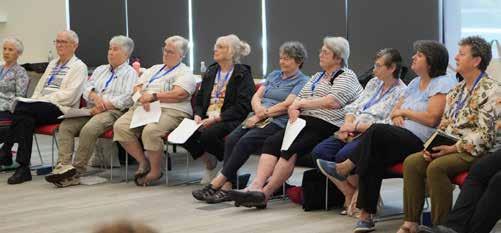

The afternoon sessions were two hours long as well with our time divided between Rev. Dr. Bill Morrow and Rev. Canon Lynn Dillabough. Dr Morrow based his lectures on the Old testament book of Leviticus. His talks included a rich mixture of history and theology that showed us the connection with this Old Testament book and the good news of the New Testament.
ties, dioceses and lifechanging programmes.
Once again we are preparing for a “new church year or season” in real life…plans for autumn programming, renewed focus on ministry with and for the elderly, youth choirs and gatherings of all sorts, and (hopefully and realistically, from what I gather other interesting and creative gatherings) and special interest in the sharing of one’s gifts, energies, talents, resources, and frankly, a new sense of togetherness, of community…now that (hopefully) the pandemic is for the most part behind us…and we have learned much from that experience… including a renewed sense of searching for community, of family, of the importance of streamed services and outreach to the most vulnerable in our communities. It’s time to re-group and give thought to what God is calling us to do as a diocese, our
Dr. Morrow is a priest of our diocese and some of his sermons can be found on You Tube. Canon Dillabough drew on her many years of experience as a counsellor to teach us the basics of being a good pastoral visitor. Her interactive style of presenting her topic really helped us to grasp what she wanted us to know. Her organized manner was very helpful as well.
parish communities, and ourselves.
St. George’s Cathedral, for one example, our mother church, has planned a “Fall Fair of September Volunteer Recruit Event” in September, following a choral Eucharist…an opportunity to meet and learn about various groups and guilds…with the hope that everyone may find a way to share our God-loaned gifts for the well-being of others. It’s a time to welcome and re-welcome and encourage people to think creatively about their own ways of participating…given, perhaps, new time commitments, ideas, searching for community…the list goes on, as we grow in our commitment as disciples and changes in life’s circumstances. Then, later in the autumn, we will have an opportunity to look at our annual and lifelong fifinancial plans and commitments…including reviewing our annual
The rest of our work day was filled with Morning Prayer, Evening Prayer and a Eucharist. With the exception of the Eucharist, our services were organized and presented by those present.
Evenings were a little less demanding but still of a high quality of entertainment. On Monday evening one of our long time lay readers in this diocese, Paul
pledges, pre-authorised giving (which has been proven to be very efficient and successful for everyone in Canada…and especially helpful when, annually, parishioners are given the opportunity to renew and perhaps increase their commitment in 2025—as Thanksgiving for God’s gifts. A good time to do this is planned for All Saints time, including Remembrance Day, and in preparation for Advent, the beginning of a new liturgical (and budget-planning time and re-evaluation of life’s priorities).
Early in October, a diocesan-wide estate planning series of seminars will be held with valuable regionally-based events! Check with the Wednesday eNews Weekly for details…a welcome addition to the three very helpful articles prepared for our Anglican Diocese of Ontario Foundation by our solicitors for personal, parish and diocesan use
Hutt, presented his gift of mime and entertainment. Tuesday was movie night complete with popcorn and Wednesday evening was the popular songfest. Spending a whole week with like minded people was again an uplifting experience. Those of us who attended will value lessons learned, conversations held, new connections made, and blessings experienced.
readily available from the Diocesan Foundation and Synod offices.
One of our guest speakers some years ago in our diocese and the Cathedral was Kennon L. Calalhan, a well-respected author and champion of congregational growth and development. Here is a quote we might want to consider as a diocesan family: “The congregations who do the best in church finances have a rich, full, abiding compassion for mission. They are motivated by a theology of service, not a theology of survival. Their compelling, driving spirit is one of striving, serving, loving mission.” Here is a good summary of what Christian stewardship (in all its forms) really means: “Remember that when you leave this earth, you can take with you nothing that you have received–only what you have given: a full heart, enriched by honest service, love, sacrifice and courage.” St. Francis of Assisi.

The following reflections are intended to encourage individuals and parishes to think about holistic stewardship and serve as guideposts along the way of our individual and collective faith journey.
Bless you during this year’s Season of Pentecost and your various activities and ministries, including the practice of stewardship. We pray for the Holy Spirit to enable and equip us in taking care of ourselves; the gift and practice of faith; our relationships; Christ’s church; our local communities; and the wider world.
September 1, 2024
A prayer for Labour Day

september 8, 2024
A prayer for the Season of Creation
september 15, 2024
A prayer for the Season of Creation
september 22, 2024
A prayer for the Season of Creation
September 29, 2024
A prayer for the Season of Creation
october 6, 2024
A reflection based on Mark 10:2-16
october 13, 2024
A prayer for Harvest and National Thanksgiving
october 20, 2024
A reflection based on Job 38:1-7, 34-41
october 27, 2024
A reflection based on Job 42:1-6, 10-17
november 3, 2024
A Prayer of Offering for today
november 10, 2024
A reflection based on Mark 12:38-44
november 17, 2024
A reflection based on Hebrews 10:11-25
november 24, 2024
A reflection based on the Readings of the Day
fifteenth SUnday after pentecost: Almighty God, creator of the world, we give thanks for the gift of stewardship and work. Deliver us, in our various occupations, from the service of self alone, that we may do our work in truth for the common good and receive fair compensation and treatment in our labour. (Source unknown).
sixteenth sunday after pentecost: Source of all life, we give thanks to you for your wondrous creation made manifest in the environment that surrounds us; strengthen us in the mission of stewardship and care towards nature, the work of your hands, encouraging us to preserve life in all its precious forms. All this we ask through Jesus Christ. (Source: Reverend Luiz Coelho, Episcopal Church of Brazil).
Seventeenth sunday after pentecost: God, the creator, give us grace to be wise stewards of your creation. Christ, the redeemer, inspire us to go out as labourers into your harvest. Holy Spirit, whose breath fills the whole creation, help us to bear the fruit of love, joy and peace. (Source: Diocese of Guilford).
eighteenth sunday after pentecost: O God, you have created the universe by your eternal Word, and have blessed humankind in making us stewards of the earth. We pray for your world, that we may share and conserve its resources, and live in reverence for the creation and in harmony with one another. (Source: Church of England Common Worship).
st. michael and all angels: God of unchangeable power, when you fashioned the world the morning stars sang together, and the host of heaven shouted for joy; open our eyes to the wonders of creation and teach us to see all things for good to the honour of your gracious name. (Source: New Zealand Prayer Book).
twentieth sunday after pentecost: It is said that stewardship is everything we do after saying we believe. Perhaps we experience this with a child-like faith with trust and thanksgiving for Jesus’ blessing upon and among us.
twenty-first Sunday after pentecost: All good gifts around us are sent from heaven above, so we lift our hearts to you, God, in praise and thanksgiving. The abundance of the harvest is a symbol of the abundance of your love in our lives. May we live in a spirit of gratitude to you and generosity to our neighbour (Source: Canadian Food grains Bank).
twenty-second sunday after pentecost: God asks a series of challenging questions, the last of which is “Who provides for the raven its prey, when its young ones cry to God and wander about for lack of food?” We pray for those who hunger and then we feed them because it is how prayer works in the church’s life and work as faithful stewards.
twenty-third sunday after pentecost: A wonderful conclusion to the Book of Job with humility, satisfaction and provision because Job prayed for his friends. May this be one more reminder of our vocation as faithful stewards to take care of all that is entrusted to us by the blessing God.
all saints sunday: God of all generations, as we worship today, we offer ourselves to you, all that we have and all that we are. Like your saints who have gone before us, we pray that you will help us be bold in our mission and in our witness. May we who have been given so much give freely, ministering in your compassion to the multitudes near to us and far from us; so that one day we may stand amidst the multitude that gathers at your heavenly throne. (Source: The United Methodist Church).
twenty-fifth Sunday after pentecost: Well, here we have in a few verses of the Bible two very different stewardship practices. Who would we say is a faithful steward and who do we desire to be in the offering of talent, time and treasure in 2024 and 2025?
twenty-sixth Sunday after pentecost: Each year at this time the stewardship reflections invite us to ask what God is calling us to do in the coming year centred in love, good deeds, encouragement and perseverance. This passage of scripture is a wonderful basis for us to give answer and faithfully respond.
the reign of christ: This week we come to the end of the church year and pause to express gratitude to God who blesses us with talent, time and treasure with Jesus showing and teaching us the way of faithful stewardship. May the Holy Spirit enable and equip us in generosity, service and worship. Amen!
Ven Bill Clarke
Our 2025 Diocesan Synod is less than a year away and there still remains matters from our 2023 Synod, specifically our pledge of support to the Sisters of Saint John the Divine (SSJD).
The Sisters of Saint John the Divine are an order of the Anglican Church of Canada, and their Motherhouse is in Toronto. The sisters continue to reach out in teaching, healing, caring, and loving the people God brings to them at the Motherhouse where they provide active hospitality, retreats, spiritual direction, and outreach into the community. They also continue to provide spiritual care to patients, staff, and students at St John’s Rehab, founded by the Sisterhood in 1936 and now part of Sunnybrook Health Sciences Centre.
During the 2023 synod we were addressed by Sister Constance Joanna of the SSJD in Toronto, a frequent visitor to and previous speaker at our diocesan synods over the last three decades. She acquainted delegates with the Sisters plan to renovate and upgrade their guesthouse.
Their project “Home for the Heart” meets the
urgent need to replace the roof, the windows, and the heating/cooling system with more environmentally friendly systems, as well as to upgrade and in some cases reconstruct bedrooms, bathrooms, and meeting rooms, including new flooring.
One of the most crucial reconstruction projects is a new accessible entrance into the Guest House. The majority of the $6 million for this project has already been raised, but the final $1million is still needed to complete what was begun.
At our last Synod, a motion was made by the Very Reverend Doug Michael and seconded by the Rev Lynn Mitchell: “Now, therefore this Synod resolves to pledge by way of contributions and solicited donations, at least $30,000 towards the refurbishment of the guest house of SSJD to support their ongoing ministry, and for the support of the future life of the Anglican communion in Canada.”
The motion was carried to raise these funds outside of the diocesan budget. In this work we celebrate with thanksgiving the hundred and thirty-eight years of ministry by the sisters of the SSJD in Toronto and the contribution of the guest house and retreat ministry of SSJD has made

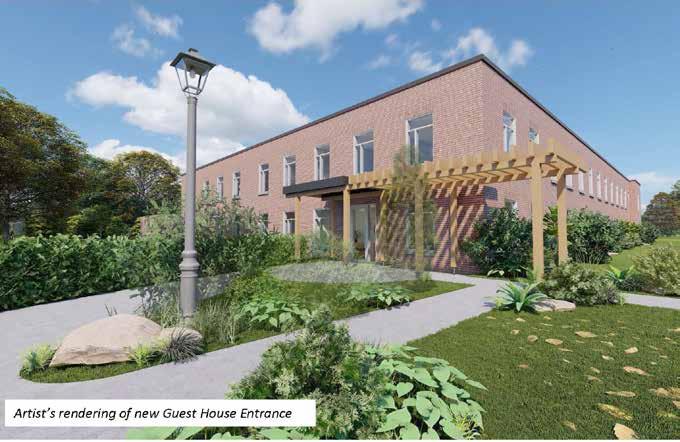
in that time to the common life and spirituality of the Anglican communion in Southern Ontario and across the Anglican Church of Canada.
The time has now come for our diocese to move forward on a promise made just over a year ago. Individual donations are welcome, and parish advisory councils are encouraged to undertake a fundraiser to support this appeal. Funds raised
Oh God, where are you in all this?
Diana Duncan-Fletcher
”Herod feared John and protected him, knowing him to be a righteous and holy man.” - Mark 6:20
Do you ever have days when nothing goes the way you want it to?
Perhaps, before you have your first cup of coffee, something upsets the apple cart and, from that moment onwards, everything goes awry.
One Sunday I recently made it to church in time and sat quietly meditating. l had chosen a spot far enough away from anyone with small children, or people with loud voices. I was able to breathe in and out and leave behind the worries of the previous week. It was a time to look out of the windows and see the trees and beautiful
are non-assessable for the purposes of CMM. Cheques can be made payable to the Anglican Diocese of Ontario with the notation of ‘SSJD Motherhouse’ on its memo line. Please support this appeal and It is our hope that we can discharge this obligation by year’s end and do our part in the renovation and restoration and repair efforts at the Motherhouse of the SSJD.
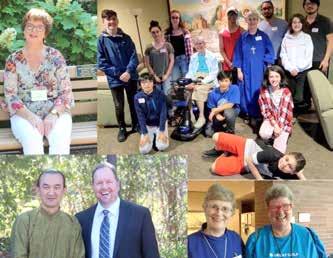
flower gardens nearby, and give thanks. All was well with my world, and I felt blessed.
Then everything changed in a split second. A woman behind me let her cell phone ping repeatedly — and did nothing to change or silence the setting, and, next, a whiny, spoiled child came in with her parents and sat behind me. The little girl was not happy, and kicked her feet over and over again onto the back of my chair. I decided to stand up and move my chair over a bit so she wasn’t directly behind me. Her mother tried placating the child with a candy. That was rejected immediately, as her daughter screamed that she didn’t like that sort of candy. Her loud voice drowned out the pinging of the cell phone, but the temper tantrum went on and on. I had had enough and moved to the other side of the church to find peace. But by then my inner self seethed with indignation and somehow I really wasn’t able to concentrate and participate in the worship service. My head ached, and I became
aware of the fact that tears were rolling down my face. “Oh, God, where are you in all this?”
A person I had never seen before suddenly appeared beside me armed with tissues, which she pressed into my hand. She whispered quietly, “You’ll be fine. Just take a big breath and then relax.” She patted my arm and then moved back to her place somewhere behind me. I was surprised, but grateful. I followed her sage advice, then blew my nose and relaxed and got back into the service.
That morning the sermon was based on Mark’s Gospel where Herod, in spite of his own feelings and beliefs, let his own pride get the best of him. He’d let his stepdaughter’s request for John the Baptist’s head on a platter, happen. He did this knowing full well it was wrong. But he had unwisely given his word to her, and he did not want to appear unworthy to her, and to the guests at his birthday celebration. It led me to think of times I had not listened to my own heart and values, and instead,
selfishly done something I knew to be wrong. It made me feel ashamed now. I wondered how Herod had coped? Did he write in his journal on papyrus that he’d really messed up that day? I thought also of how his relationship with his wife might have changed due to this action. It must have been a difficult time. Definitely he was having one of those days I described at the beginning of this article. Lots of food for thought. At the end of the service, I looked for the woman who had been so kind to me. She was nowhere to be found. I asked several people in the row behind me if they knew who she was. No one, it appeared, had even seen her come forward. I got some strange looks. Then I remembered that I had stated somewhat defiantly, “Oh, God, where are you in all this?” Was she actually another of my guardian angels at work when I needed her? I was certainly grateful. The peace of the morning had reappeared, and I was able to rejoice and move on. Thanks be to God! dduncanfletcher2@gmail.com


https://www.facebook.com/pwrdfcan/
September 10, 2024 9 am to 3:30 pm.
Retreat leader: Rev. Margaret Johnston-Jones, leads us through our theme of ‘Gratitude.’
All women of the diocese are welcome. Please come and spend a day of fellowship at the Italo-Canadian Club, 1174 Italia Lane in Kingston.
Cost: $71 including luncheon buffet and refreshments. Deadline for registration: August 15.
Make cheques out to the Italo-Canadian Club and mail to:
Margie Mulvihill, 269 Hudson Point Road, Elizabethtown, Ont. K6V 7E3. (613) 342-3281, margiemulivhill@gmail.com.
More information: Margie Mulvihill at margiemulivhill@gmail.com.
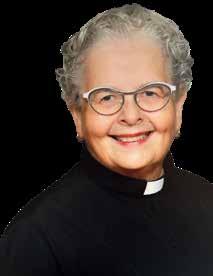
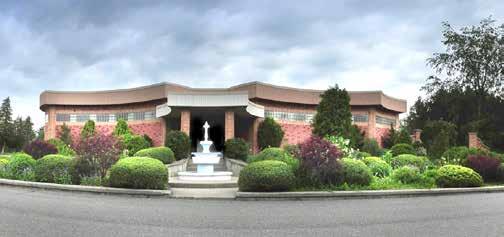
Here is an invitation to all visionary and committed supporters of the Anglican community and friends, as well as those in partnership with the Community Foundation for Kingston & Area....


The Foundation supports innovative approaches to the building of community through education, service, support and crisis assistance. As responsible stewards of God’s gifts, the Foundation provides funding to revitalize Anglican parishes, and supports ministry to the wider community through our partnerships with various non-profit groups and business organizations, especially helping the most vulnerable in our communities.
The Anglican Diocese of Ontario Foundation depends entirely on the support of generous donors to fulfill our mission. We continue to count on your Fearless Generosity to make these dreams become reality.
We invite you to join us.
Please support the Autumn appeal of the Foundation with a gift....as individuals and families, parishes and community members. Consider a monthly contribution, perhaps through Canada Helps.
Please check our website for up-to-date information and news, illustrating how to make a gift, including a legacy gift, and apply for a programme or ministry grant, either directly through the Foundation or by application to the Fearless Generosity Fund of the Community Foundation for Kingston & Area.